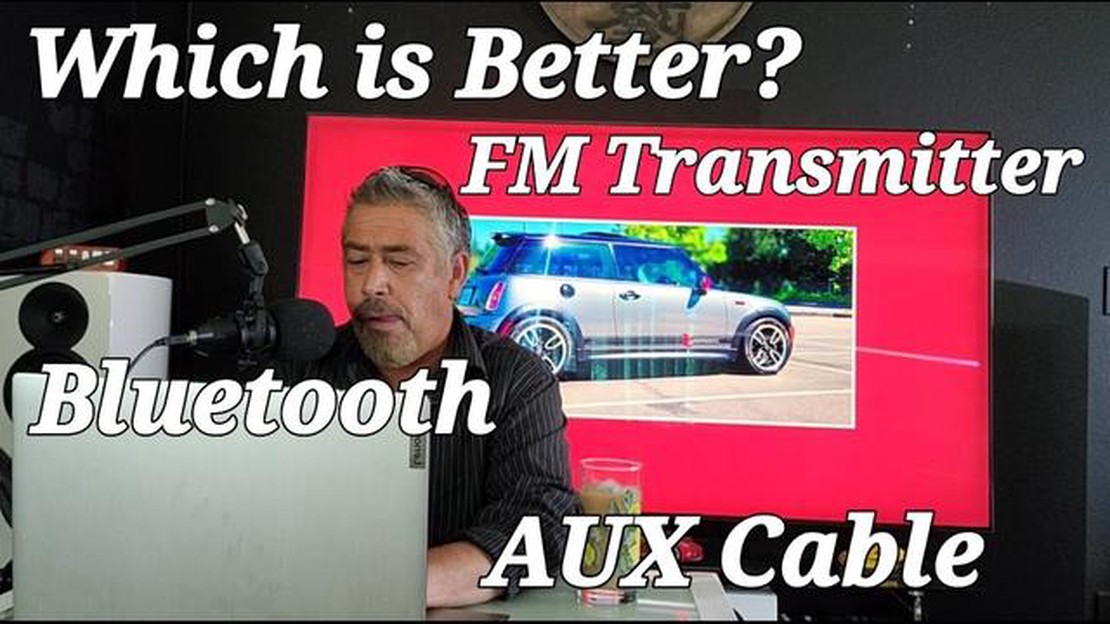Contact Icici Bank from UK: Simple Methods and Efficient Solutions
How to Contact ICICI Bank from the UK ICICI Bank is one of the leading private sector banks in India, with a broad range of financial products and …
Read Article
When it comes to playing music in your car, there are several options available, but two of the most popular are FM transmitters and Bluetooth. Both technologies allow you to wirelessly connect your smartphone or other devices to your car’s audio system, but which one is better? Let’s take a closer look at the pros and cons of each.
FM transmitters work by broadcasting your device’s audio signal over an unused FM frequency on your car’s radio. They are typically small devices that plug into your car’s cigarette lighter or power outlet and connect to your device via a headphone jack or Bluetooth. While FM transmitters are easy to use and relatively inexpensive, they can suffer from interference and a decrease in audio quality, especially in areas with a lot of radio stations.
On the other hand, Bluetooth allows for a direct wireless connection between your device and your car’s audio system. This technology is built into most new cars and many aftermarket stereos, making it a convenient option for many people. Bluetooth offers a more stable and reliable connection than FM transmitters and provides higher audio quality. Additionally, Bluetooth allows you to control your device and make hands-free calls through your car’s audio system.
So, which one is better: FM transmitter or Bluetooth? While both options have their advantages and disadvantages, it ultimately depends on your personal preferences and needs. If you are looking for a quick and affordable solution, an FM transmitter may be the way to go. However, if you value convenience, reliability, and superior audio quality, Bluetooth is the clear winner. Ultimately, it’s important to consider your budget, the audio quality you desire, and the features you need before making a decision.
When it comes to choosing between an FM transmitter or Bluetooth for wireless audio in your car or other devices, there are several factors to consider. Both options allow you to connect your device to your car’s stereo system or speakers without the need for wires, but they have different pros and cons.
| FM Transmitter | Bluetooth |
|---|---|
| Uses FM radio frequency to transmit audio | Uses short-range wireless technology |
| Requires an available FM radio frequency in your area | Does not require any specific frequency |
| May experience interference from other FM signals | Less prone to interference and provides better audio quality |
| Easy to set up and use | May require pairing and configuration with your device |
| Relatively inexpensive | Can be more expensive |
| Requires charging or power source for operation | Battery-powered or can be powered by the device it’s connected to |
| Provides lower audio quality compared to Bluetooth | Offers better audio quality and supports more advanced features |
| Compatible with most devices with a headphone jack or audio output | Compatible with devices that have Bluetooth capabilities |
In conclusion, the choice between an FM transmitter and Bluetooth depends on your specific needs and preferences. If you prioritize convenience and affordability, an FM transmitter may be suitable for you. However, if you value better audio quality and more advanced features, Bluetooth is the way to go. Consider the pros and cons listed above to make an informed decision.
Pros:
Cons:
Overall, FM transmitters can be a convenient and cost-effective option for adding wireless audio connectivity to your car. However, they may not deliver the same sound quality and control as Bluetooth or other alternatives. Consider your needs and preferences before deciding which option is best for you.
Bluetooth technology has become increasingly popular in recent years for various wireless applications. While there are many benefits to using Bluetooth, there are also some drawbacks that should be considered. Here are the pros and cons of Bluetooth:
Read Also: Beginner's Guide: Trading in Options and Futures in India
Pros:
4. Seamless Connectivity: Bluetooth provides seamless connectivity, allowing devices to connect automatically once they are in range. This makes it easy to connect devices and transfer data without any manual pairing or configuration processes. 5. Versatility: Bluetooth technology can be used for a wide range of applications, such as wireless audio streaming, hands-free calling, file sharing, and more. This makes it a versatile option for users who require multiple functionalities.
Cons:
Read Also: Understanding the Potential Risks of Options Trading - Important Factors to Consider2. Interference: Bluetooth operates on the 2.4 GHz frequency, which is a commonly used frequency band for many other wireless devices, such as Wi-Fi routers and microwaves. This can lead to interference issues and reduced performance in crowded environments.
 3. Slower Transfer Speeds: Compared to some other wireless technologies, such as Wi-Fi or wired connections, Bluetooth typically has slower transfer speeds. This can be a limiting factor when transferring large files or streaming high-quality audio or video.
4. Security Concerns: Bluetooth connections can potentially be vulnerable to security risks, such as hacking or unauthorized access. However, modern Bluetooth versions have implemented security measures, such as encryption, to mitigate these risks.
5. Compatibility Issues: While Bluetooth is a widely adopted standard, there can still be compatibility issues between different devices, especially when it comes to older devices or devices from different manufacturers. This can sometimes lead to connectivity problems or limited functionality.
3. Slower Transfer Speeds: Compared to some other wireless technologies, such as Wi-Fi or wired connections, Bluetooth typically has slower transfer speeds. This can be a limiting factor when transferring large files or streaming high-quality audio or video.
4. Security Concerns: Bluetooth connections can potentially be vulnerable to security risks, such as hacking or unauthorized access. However, modern Bluetooth versions have implemented security measures, such as encryption, to mitigate these risks.
5. Compatibility Issues: While Bluetooth is a widely adopted standard, there can still be compatibility issues between different devices, especially when it comes to older devices or devices from different manufacturers. This can sometimes lead to connectivity problems or limited functionality.
In conclusion, Bluetooth offers numerous advantages in terms of convenience, compatibility, energy efficiency, and versatility. However, it also has limitations concerning range, interference, transfer speeds, security, and compatibility. When choosing between Bluetooth and other wireless technologies, it is essential to consider these pros and cons based on specific requirements and use cases.
An FM transmitter is a device that allows you to broadcast audio from your phone or other device to a nearby FM radio.
A Bluetooth connection is a wireless technology that allows for the transfer of data between devices over short distances. It works by creating a direct link between two devices and transmitting data through radio waves.
Using an FM transmitter allows you to play audio from your phone through your car’s speakers, even if your car does not have Bluetooth capabilities. It is a wireless solution that provides easy and convenient access to your favorite music and podcasts while driving.
Bluetooth has several advantages over an FM transmitter. It provides a direct and stable connection between your phone and car stereo system, without the need for tuning to a specific FM frequency. Bluetooth also allows for hands-free calling and controlling music playback directly from your car’s controls.
How to Contact ICICI Bank from the UK ICICI Bank is one of the leading private sector banks in India, with a broad range of financial products and …
Read ArticleChoosing the Best Forex Demo Account: A Comprehensive Guide Are you new to forex trading? Or maybe you’re a seasoned trader looking to test out new …
Read ArticleIs it worth having a brokerage account? A brokerage account is an investment account that allows you to buy and sell various financial assets, such as …
Read ArticleUnderstanding the Super Trend Non-Repaint Indicator Are you tired of using lagging indicators that provide old and unreliable trading signals? If so, …
Read ArticleAre Demo Accounts Real? When it comes to trading in financial markets, demo accounts have become a popular tool among beginners and experienced …
Read ArticleUnderstanding Vesting of Non-Qualified Stock Options Non-qualified stock options (NSOs) are a popular form of employee compensation that provides …
Read Article